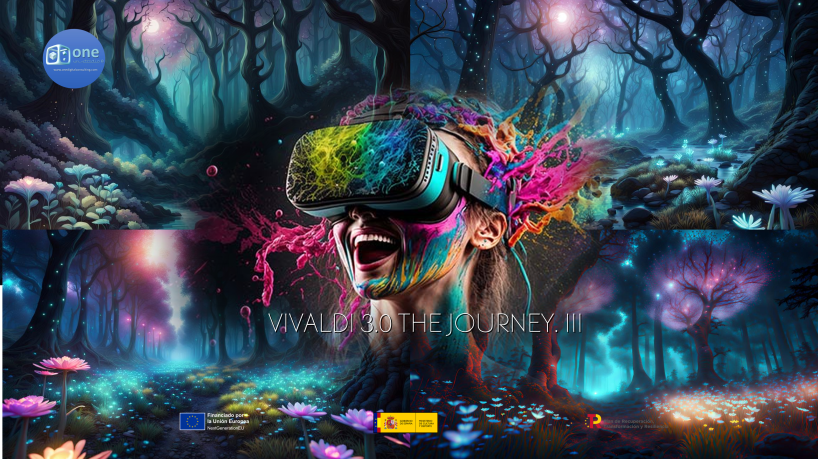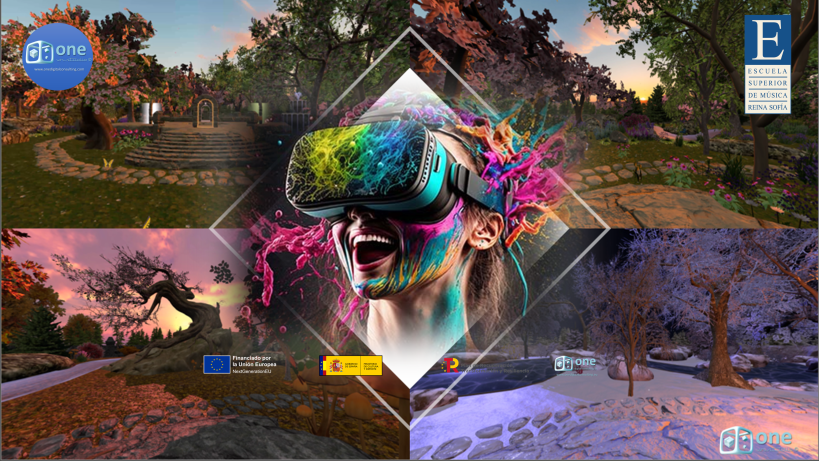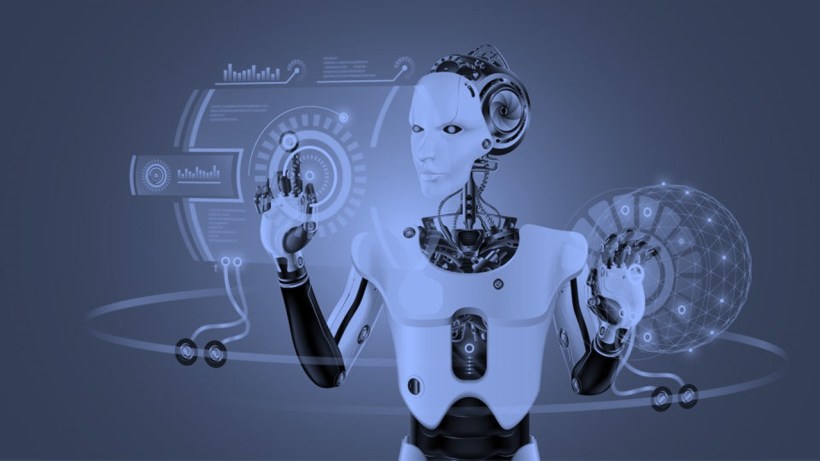«Journey Through the Immersive Universe of Four Seasons» is an interactive xr experience that immerses viewers into the realm of Antonio Vivaldi’s musical masterpieces. Through visually compelling storytelling, participants will delve into Vivaldi’s creative journey as he breathes life into his renowned concerto «The Four Seasons.» Each season unfolds in a distinct and captivating environment, seamlessly blending natural elements and music to deliver a multisensory and enchanting encounter.
As artists, musicians, and creatives, we find ourselves at a true crossroads—a junction where making the right choices is neither easy nor singular. Beyond the numerous apparent opportunities before us, we must navigate financial survival and address the sustainability of teams, technicians, and the myriad fellow travelers who render our projects minimally viable and appealing to an ever-changing society hungry for new, distinct, and increasingly participatory experiences.
Our journey began over a decade ago with our first forays into immersive 360º recordings, collaborating with artists, musicians, and music classrooms. Here, we began to experiment and learn from the sensations and perceptions conveyed by users, students, and teachers.
One of the pivotal moments in our journey was the first live performance featuring renowned artists like Ouka Leele, where we embarked on an interactive interpretation inspired by the sounds of the Concerto de Aranjuez. It was a fascinating experience, devoid of prior rehearsals or experiential training, executed on a digital stage using Oculus Rift equipment and Tilt Brush from Google, and recorded in 360º stereo with Vuze 360º cameras. This opportunity to recreate Digital Ephemeral Art raised initial doubts regarding feasibility, sustainability, and monetization in more straightforward and economically accessible spaces, as we spared no means or resources for this performance. Crucially, this experience was made possible through the indispensable collaboration of CEV‘s technical team.
Later on, we delved into the world of reconstructing the virtual museum of the Arab Kunka (Cuenca ancient city)—a collaborative, immersive space within the Frame VR platform. Here, we established a connection between the virtual reconstructions of the Ancient Kunka during the Arab era and the music of the great musician and composer Chema Vílchez, particularly his work «The Land of the Three Cultures».
As visitors strolled through the ancient Arab fortress, its mosques, baths, buildings, markets, and streets, they were enveloped in the sound of music that transported them to bygone eras, while also being able to explore current spaces through 360º videos. This interconnection between virtual reconstructions, current videos, and music elevated the experience to a higher level, almost teleporting participants to that magical bygone time.
Years later, the Reina Sofia Higher School of Music presented us with a truly intriguing challenge. We were tasked with creating an experience using recordings from a classical music concert to reach students in their educational program who, due to pandemic-related time constraints, were unable to participate in workshops and concerts. This concert was recorded in the Sony auditorium of the school, utilizing 360º 4K cameras and ambisonic microphone technology. The acoustical characteristics of the auditorium are truly exceptional, enabling us to produce recordings of the utmost quality. We utilized Vuze and Zoom equipment, as well as VR devices from Pico, with technological support from HP.
This experience allowed us to craft 12 virtual musical stories centered around artists such as Mozart, Tchaikovsky, and Respighi, where musical compositions intertwined with natural spaces, sensory explosions, and magical worlds, transporting visitors through 12 unique historical narratives. As a result of this endeavor, we developed «Music with the Five Senses,» which was implemented on a Virtual Reality platform and Pico devices, visiting hundreds of schools and educational centers nationwide over the years. Thousands of visitors have immersed themselves in this wonderful and experiential world, making it a true milestone and international benchmark as an immersive educational project centered around classical music.
The next stop on this journey is Vivaldi 3.0. The Journey to the Universe of Antonio Vivaldi and the Four Seasons, led by Ara Malikian and the Camerata of the Reina Sofia School, has been a mystical experience, with a predetermined start date and script, and a long journey through the forests of magical seasonal music. Along the way, we’ve encountered numerous passages and experiences that ultimately culminated in an absolutely magical work. This journey, based on Vivaldi’s original sonnets, reinterpreted by a team of writers and Ara himself, allowed us to rediscover the connections between music, nature, and the cycle of life. Throughout this process, we’ve painted on a virtual canvas, initially blurry passages gradually taking shape into a metaphorical interpretive tableau. Throughout this process, we’ve immersed ourselves in music and creativity, repeatedly playing with the tools offered by generative artificial intelligence, which helped us reinterpret passages and scenarios through Vivaldi’s sonnets and words, Ara’s interpretations, and our own way of composing this tableau, ultimately giving it a cohesive and coherent form. We aimed for it to be timeless, appealing to various types of audiences, inviting them to return to a childlike state and be carried away by the creative spirit of the compositions and the intersection with the cycle of life, both human and natural. And all this, with a commitment to sustainability, balance, equality, and educational vision through values inspired by the emotions and sensations we’ve gathered in the project. This is our way of contributing to the awareness of the need to accelerate societal transformation.
The first test to visualize the outcome of this initial step of the project was the concert held on January 29th at the Sony auditorium of the Reina Sofia School. It was a real trial by fire, where we had to present this new proposal for an interactive multimedia concert live to a select audience: students and teachers from various schools in the Community of Madrid. It was a multimedia experience where interactivity through monitors and screens, interactions among musicians on stage, Ara Malikian’s performance, his introductory messages for each movement, and images, passages, and videos related to the movements were put to the test.
More than 600 students from a dozen public and private schools in the Community of Madrid, accompanied by their teachers in two sessions, were able to enjoy this experiential session, with an extremely high level of satisfaction. And all this was made possible thanks to the perfect coordination between the ONE team and the production, audio, and video team of the School. We had top-of-the-line equipment and professionals of the highest caliber. The journey has only just begun, and this experience has allowed us to analyze and evaluate the initial results, and to envision how we can continue advancing and projecting new immersive experiences in the immediate future. We aim to enhance the experience by integrating 3D multimedia elements more extensively, as well as enhancing the pre- and post-concert experience.
Welcome to the interactive immersive world of Vivaldi 3.0. Step into a space where reality merges with imagination, where every corner is filled with magic, and music awaits you at every turn. As you enter the world of the four seasons, you’ll find yourself surrounded by vibrant landscapes pulsating with energy and creativity. Feel the thrill of immersing yourself in a world where the boundaries of reality blur, and your senses awaken like never before. Interact with the environment around you: touch, explore, listen, and engage with the elements inhabiting this fascinating world. Whether you get lost in enchanted forests or dive into the depths of the unknown, each experience is yours to discover and shape. Prepare to be captivated by the sights, sounds, and sensations enveloping you as you delve deeper into this immersive universe throughout the cycle of life.
So, welcome to a world where dreams come to life, and the extraordinary awaits you around every corner! Let your curiosity guide you as you embark on an exciting and unforgettable journey through the Interactive Immersive Universe of Vivaldi’s Four Seasons.
Here are some figures reflecting and highlighting the extraordinary effort involved in this journey: An experience recorded and produced in 6 months, many locations, involving more than 50 professionals and over 4,000 hours of work, recording 4 live concerts with the attendance of over 1,000 people (students & teachers) from 20 schools. An immersive experience available on VR devices and the Web XR immersive platform, featuring 4 spaces, or «stations,» with interactive games, integration of 3D volumetrics, hundreds of photographic images, 10 hours of concert recordings in 8k, several terabytes of video and sound files, hundreds of hours of processing and post-production, hundreds of hours of editing and format integration…hundreds of images generated by AI to create virtual spaces and environments, artificial intelligence and image processing, 8K 360º cameras, ambisonic sound, creation of countless 3D assets…
8K Enables Immersive Vivaldi 3.0 Project
By Bob Raikes
…and this is just one of the stops on this magical and unique journey.
Carlos J. Ochoa Fernández ©











